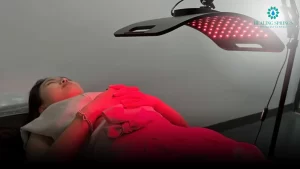Navigating the tumultuous teenage years comes with its challenges, and it’s not uncommon for anxiety to become a part of the journey. The National Institute of Mental Health reports that 31.9% of teens have some form of anxiety. As parents, recognizing the signs of anxiety in your teen is the first step towards providing the support and understanding they need. In this guide, we’ll explore the subtle cues that may indicate anxiety in your teenager, empowering you to foster open communication and facilitate their mental well-being.

Behavioral Changes:
Pay attention to shifts in your teen’s behavior. Sudden withdrawal from social activities, changes in sleep patterns, or alterations in eating habits can be indicators of underlying anxiety. Keep an open line of communication to understand the reasons behind these changes.
Academic Struggles:
While academic challenges are a part of adolescence, persistent difficulties or a sudden decline in grades might be linked to anxiety. Be attentive to your teen’s academic performance and discuss any challenges they may be facing, offering support and encouragement.
Physical Symptoms:
Anxiety often manifests physically. Headaches, stomachaches, muscle tension, or frequent fatigue may be signs that your teen is grappling with heightened stress levels. If these symptoms persist, consider seeking guidance from a healthcare professional.
Irritability and Mood Swings:
Teenagers are known for their mood swings, but extreme irritability or sudden changes in mood might be indicative of underlying anxiety. Approach your teen with empathy, creating a safe space for them to express their feelings without judgment.
Perfectionism and Overachievement:
While ambition is commendable, an unhealthy drive for perfectionism and overachievement may be a coping mechanism for anxiety. Encourage a balanced approach to success, emphasizing the importance of well-being over unattainable standards.
Social Withdrawal:
Isolation from friends and family can be a red flag. Teens with anxiety may avoid social situations due to fear of judgment or heightened self-consciousness. Foster an environment where your teen feels comfortable discussing their social experiences.
As a parent, your role is pivotal in supporting your teen’s mental health. By recognizing the signs of anxiety, you can initiate open conversations, offer understanding, and seek professional help if needed. Remember, it’s okay not to have all the answers. Creating a supportive environment and actively listening to your teen can make a significant difference in their well-being.
If you notice persistent signs of anxiety in your teen, consider scheduling a consultation with our compassionate therapists at Healing Springs Wellness Center for further guidance. We also offer a closed therapy group, “Overcoming Anxiety,” designed for teens aged 13-17. Click here for details about the group. Together, as a family, you can navigate the challenges of adolescence and promote a healthy and resilient mindset in your teenager.




